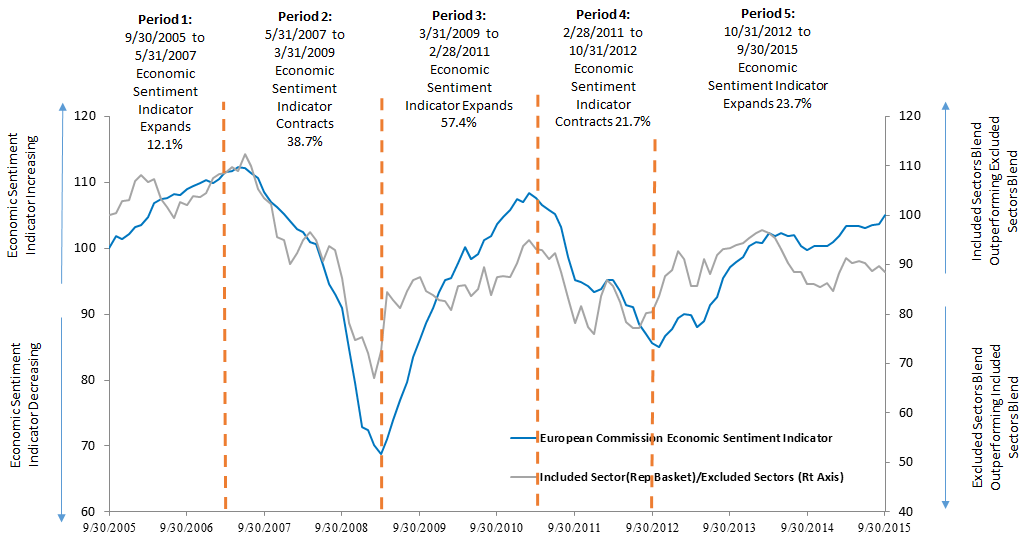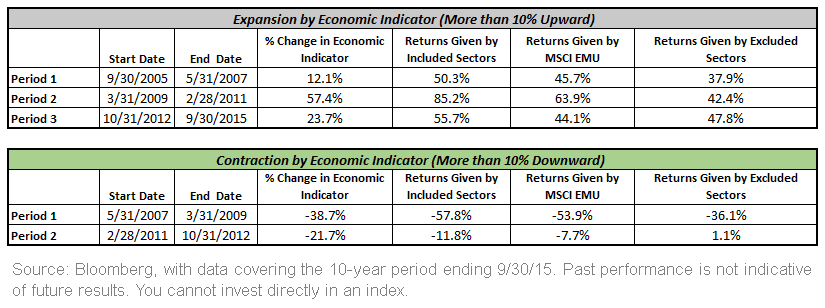How European Companies Respond to Changing Growth Prospects



 For definition of indexes in the chart, visit our glossary.
• Performance during Expansions: Here we define expansions as periods in which the European Commission’s Economic Sentiment Indicator increased by 10% or more over the previous 10 years. There were three such periods, and in each case, the blend of included sectors outperformed both the MSCI EMU Index and the blend of excluded sectors.
• Performance during Contractions: Conversely, we define contractions as periods in which the European Commission’s Economic Sentiment Indicator decreased by 10% or more over the previous 10 years. There were two such periods, and in each case, the returns of the included sectors underperformed those of both the MSCI EMU Index and the blend of excluded sectors. These were also challenging environments for the market in general, with the big decline in the sentiment indicator occurring during the global financial crisis, when the MSCI EMU Index fell by more than 50%.
These results align with what we think are natural expectations—cyclical sectors had a tendency to outperform as perceptions of economic growth improved, whereas defensive sectors had a tendency to do the same as those perceptions declined.
Much of the macroeconomic work suggests that the eurozone’s local economic recovery is in its early stages.4 We believe the WisdomTree Europe Local Recovery Index is well positioned for such a growth outlook.
1Blend of included sectors: The blend of included sectors relates to the mixture of sectors allowable for inclusion within the WisdomTree Europe Local Recovery Index, adjusted proportionately for the country exposures of this Index as of 9/30/15. Blend comprises solely MSCI Indexes as follows: MSCI France Consumer Discretionary Index, 9.66%; MSCI France Industrials Index, 9.66%; MSCI France Financials Index, 9.66%; MSCI France Information Technology Index, 4.83%; MSCI France Energy Index, 2.76%; MSCI Germany Financials Index, 8.97%; MSCI Germany Industrials Index, 8.97%; MSCI Germany Consumer Discretionary Index, 8.28%; MSCI Germany Materials Index, 4.14%; MSCI Germany Information Technology Index, 2.76%; MSCI Italy Financials Index, 11.72%; MSCI Italy Consumer Discretionary Index, 4.14%; MSCI Italy Industrials Index, 2.76%; MSCI Spain Financials Index, 4.83%; MSCI Spain Consumer Discretionary Index, 4.14%; and MSCI Spain Industrials Index, 2.76%.
2Subsequent to Index screening, it is possible that a current constituent may spin off a subsidiary company that may be classified as a Consumer Staples, Health Care, Telecommunication Services or Utilities sector firm. Spun off firms that remain in the Index do not get removed between Index rebalances due to their sector classification.
3Blend of excluded sectors: The blend of excluded sectors is equally weighted between the MSCI EMU Consumer Staples Index, MSCI EMU Health Care, Telecommunication Services and Utilities Indexes.
4Source: Bloomberg, as of 9/30/15.
For definition of indexes in the chart, visit our glossary.
• Performance during Expansions: Here we define expansions as periods in which the European Commission’s Economic Sentiment Indicator increased by 10% or more over the previous 10 years. There were three such periods, and in each case, the blend of included sectors outperformed both the MSCI EMU Index and the blend of excluded sectors.
• Performance during Contractions: Conversely, we define contractions as periods in which the European Commission’s Economic Sentiment Indicator decreased by 10% or more over the previous 10 years. There were two such periods, and in each case, the returns of the included sectors underperformed those of both the MSCI EMU Index and the blend of excluded sectors. These were also challenging environments for the market in general, with the big decline in the sentiment indicator occurring during the global financial crisis, when the MSCI EMU Index fell by more than 50%.
These results align with what we think are natural expectations—cyclical sectors had a tendency to outperform as perceptions of economic growth improved, whereas defensive sectors had a tendency to do the same as those perceptions declined.
Much of the macroeconomic work suggests that the eurozone’s local economic recovery is in its early stages.4 We believe the WisdomTree Europe Local Recovery Index is well positioned for such a growth outlook.
1Blend of included sectors: The blend of included sectors relates to the mixture of sectors allowable for inclusion within the WisdomTree Europe Local Recovery Index, adjusted proportionately for the country exposures of this Index as of 9/30/15. Blend comprises solely MSCI Indexes as follows: MSCI France Consumer Discretionary Index, 9.66%; MSCI France Industrials Index, 9.66%; MSCI France Financials Index, 9.66%; MSCI France Information Technology Index, 4.83%; MSCI France Energy Index, 2.76%; MSCI Germany Financials Index, 8.97%; MSCI Germany Industrials Index, 8.97%; MSCI Germany Consumer Discretionary Index, 8.28%; MSCI Germany Materials Index, 4.14%; MSCI Germany Information Technology Index, 2.76%; MSCI Italy Financials Index, 11.72%; MSCI Italy Consumer Discretionary Index, 4.14%; MSCI Italy Industrials Index, 2.76%; MSCI Spain Financials Index, 4.83%; MSCI Spain Consumer Discretionary Index, 4.14%; and MSCI Spain Industrials Index, 2.76%.
2Subsequent to Index screening, it is possible that a current constituent may spin off a subsidiary company that may be classified as a Consumer Staples, Health Care, Telecommunication Services or Utilities sector firm. Spun off firms that remain in the Index do not get removed between Index rebalances due to their sector classification.
3Blend of excluded sectors: The blend of excluded sectors is equally weighted between the MSCI EMU Consumer Staples Index, MSCI EMU Health Care, Telecommunication Services and Utilities Indexes.
4Source: Bloomberg, as of 9/30/15.
Important Risks Related to this Article
Investments focused in Europe increase the impact of events and developments associated with the region, which can adversely affect performance.

Jeremy Schwartz has served as our Global Chief Investment Officer since November 2021 and leads WisdomTree’s investment strategy team in the construction of WisdomTree’s equity Indexes, quantitative active strategies and multi-asset Model Portfolios. Jeremy joined WisdomTree in May 2005 as a Senior Analyst, adding Deputy Director of Research to his responsibilities in February 2007. He served as Director of Research from October 2008 to October 2018 and as Global Head of Research from November 2018 to November 2021. Before joining WisdomTree, he was a head research assistant for Professor Jeremy Siegel and, in 2022, became his co-author on the sixth edition of the book Stocks for the Long Run. Jeremy is also co-author of the Financial Analysts Journal paper “What Happened to the Original Stocks in the S&P 500?” He received his B.S. in economics from The Wharton School of the University of Pennsylvania and hosts the Wharton Business Radio program Behind the Markets on SiriusXM 132. Jeremy is a member of the CFA Society of Philadelphia.

